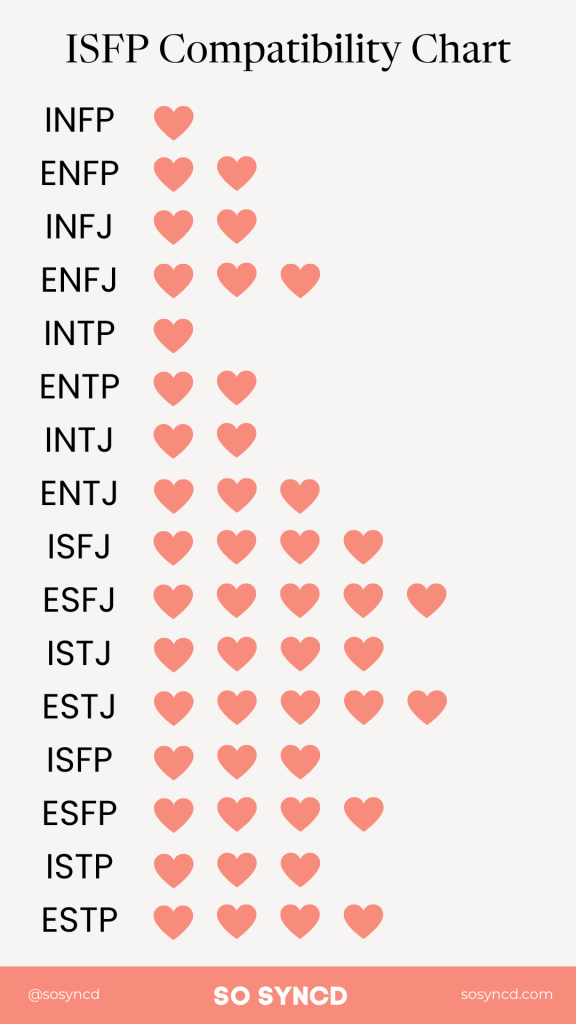Understanding ISFP Compatibility & Relationships
ISFPs are driven by their values, so they naturally seek out relationships that align with their beliefs. People of this personality type are full of paradoxes. They are both reserved yet unpredictable, independent yet loyal, and grounded yet idealistic. This makes them unique partners who have a unique charm. When it comes to love and compatibility, ISFPs are some of the more emotional personality types. They feel everything deeply, but they are often private about their emotions. This means that they can come across as aloof in the early stages of dating, even if they like you.

ISFPs are driven by their values, so they naturally seek out relationships that align with their beliefs. People of this personality type are full of paradoxes. They are both reserved yet unpredictable, independent yet loyal, and grounded yet idealistic. This makes them unique partners who have a unique charm. When it comes to love and compatibility, ISFPs are some of the more emotional personality types. They feel everything deeply, but they are often private about their emotions. This means that they can come across as aloof in the early stages of dating, even if they like you.
ISFP relationships basics
When an ISFP enters into a relationship, they are looking for a meaningful emotional connection. They are known for being in touch with their intuition and feelings, which enables them to bring empathy and understanding to the relationship. Other characteristics associated with ISFPs are authenticity, sensuality, and empathy. This combination of traits makes them great partners.
ISFPs value relationships that are built on trust and mutual respect. They want to be understood and accepted for who they are, not judged or criticized. While they can go through periods of their life where they are comfortable with casual dating, they prefer to be in a committed, long-term relationship. When in a relationship, they strive to create a safe space for their partner to express themselves.
If there’s one thing you can count on, it’s that ISFPs will go above and beyond to make their partner feel understood. They take a ‘live-and-let-live’ approach to life, and they don’t require their partner to conform to traditional expectations. However, ISFPs can be more reserved than other personality types when it comes to expressing themselves. This can lead to trouble, as they may have difficulty communicating their feelings and needs.
ISFP relationships in depth
As naturally private people, ISFPs can struggle to open up to their partners in the early stages of dating. It can be hard to tell if an ISFP likes you at first. For an ISFP, it’s important that they feel secure in the relationship before revealing their innermost thoughts and feelings. Despite being feelers, they tend to be quite guarded about their emotions, and it can take them time to trust people. If an ISFP does decide to open up, it means they see potential in the relationship and genuinely care about their partner.
When ISFPs do open up, they are often extremely passionate and dedicated partners. They tend to be physical in relationships, often showering their partners with affection and appreciation. As natural listeners, ISFPs are great at lending an empathetic ear to their significant others. They are also known for being creative and romantic, often finding unique ways to express their love.
As a result of their empathetic nature, they tend to stay committed even when their partners make mistakes or hurt them in some way. They have a remarkable ability to forgive others with grace when necessary, offering renewed hope even after going through difficult times together as a couple. However, their idealism when it comes to love can sometimes be too optimistic. This means that they may be more likely to stay in unhealthy relationships than other personality types.
ISFP compatibility basics
ISFPs are drawn to people who share their values and appreciate their gentle, sensitive nature. They often look for someone with whom they can explore the depths of their feelings and passions. Other traits that ISFPs value in a partner include honesty, loyalty, and open-mindedness. These are the qualities that encourage them to be authentic and open in their relationship.
As arguably the most free-spirited personality type, ISFPs aren’t overly concerned with structure, traditions, or expectations. They need partners who understand this and who can appreciate their creative and imaginative ways of expressing themselves. Essentially, ISFPs work best with people who understand that they don’t always have to follow the rules and will support them in their pursuits. If we could give you one piece of advice, it would be: don’t tell an ISFP what to do!
At the end of the day, ISFPs need a partner who won’t be overwhelmed by their intense emotions. In fact, ISFPs can be deceptive in that they can come across as quite aloof, but deep down, they are a whirlwind of emotions. This doesn’t mean they are moody or high maintenance—they just feel things more deeply than others.
ISFP compatibility in depth
People of this personality type are most compatible with partners who understand their uniqueness and individualism. They need someone who can accept their quirks and idiosyncrasies without trying to change them. If you’re the kind of person who takes social norms very seriously, you probably won’t be the best match.
ISFPs also look for partners who are kind, loyal, and honest. In general, they have a gentle manner, and they appreciate partners who look out for them and make sure that they feel heard. They aren’t known for being the most practical people, so they can benefit from being with someone who can steer them in the right direction and make sure that their decisions are well thought out.
When an ISFP does meet someone with whom they feel a strong sense of connection, they can sometimes get completely caught up in their emotions. This means that they can end up missing red flags. The fact that they are deeply empathetic as well can mean they struggle to set boundaries. This is why it’s important for ISFPs to look out for partners who are honest and reliable— someone who doesn’t take advantage of their kindness.

ISFP compatibility chart
While every personality type pairing can work in relationships, some are more likely to see success than others. Here is our compatibility chart that shows the potential for ISFP relationships with different personality types.

ISFP strengths in relationships
The following strengths are typical of ISFPs in relationships.
1. Accepting. ISFPs are one of the most open-minded and accepting personality types. They appreciate that different approaches to life suit different people, and as long as their core values aren’t violated, ISFPs are supportive of their partners exploring new paths.
2. Independent. ISFPs strongly value freedom. In order to feel happy, they need to be able to follow their heart, and anyone they date should appreciate this. This means giving them the space they need to be creative and have some alone time to recharge.
3. Sensual. ISFPs are sensual, and they live in the moment. They’re affectionate, and they value physical touch. But only once they know someone well and feel comfortable with them. With their unique mix of being imaginative yet present, ISFPs love bringing their ideas to life in the physical world.
4. Caring. ISFPs are sensitive and caring. They are often able to see situations from their partner’s point of view, which is one of the reasons why they tend to be so empathetic. In addition, people of this personality type are loyal and will always be there for their partners when times are tough.
ISFP weaknesses in relationships
The following weaknesses can be typical of ISFPs in relationships.
1. Overly idealistic. ISFPs are sometimes too idealistic and can end up putting their partner on a pedestal. If they don’t make a conscious effort to reign in their idealism, it can cause friction and unrealistic expectations. They need to remember that nobody is perfect, and thinking otherwise is unrealistic.
2. Overly emotional. ISFPs can react in a highly emotional way during stressful situations, which can cause unnecessary stress. When an ISFP feels strongly about something during an argument, they can get completely caught up in their emotions and lose sight of the big picture.
3. Averse to criticism. ISFPs can be averse to criticism and can take it personally. They can feel hurt by negative feedback, even if it was shared with good intentions. This is because their identity is connected so strongly to their values and opinions.
4. Disorganized. ISFPs are one of the least organized personality types. As a result, they may turn up late for dates or forget to pay bills. Structure and routine just don’t come naturally to people of this personality type, which can mean that they end up living in chaos.
ISFP falling in love basics
Love is often a binary experience for ISFPs. When they find the right person, they fall hard and fast. They don’t settle for anything less than their ideal, and when that person comes along, it can be a whirlwind of emotions. Or sometimes, it’s more like a rollercoaster!
ISFPs trust their gut instinct when it comes to compatibility and love. They are often able to tell instantly whether someone is right for them and whether they will form an emotional connection. Essentially, it doesn’t take long for an ISFP to get a sense of whether they’ll be able to build a lasting relationship with someone.
As introverts who are often highly independent, ISFPs have limited energy for social interactions, so they won’t waste time on people who they don’t think are a good match. ISFPs aren’t known for their decisiveness in most areas of life…but they do know what they want in a partner. When it comes to falling in love, ISFPs often have an idea of what they’re looking for.
ISFPs also use love as a way of exploring and understanding the depths of their own emotions. As they open themselves up to the intense feelings that come with love, they learn more and more about themselves. They are in tune with their feelings, and they find the whole process of falling in love exhilarating. Some ISFPs use love as inspiration for art projects, too.
ISFP falling in love in depth
If there’s one thing you can count on if life, it’s that ISFPs will fully embrace the experience of falling in love. They may not always make rational decisions, but their heart often knows what it wants, and they won’t hesitate to follow it. When they’re in love, they may feel overwhelmed by their emotions.
But there are risks associated with this, too. Someone who loves so intensely is also capable of being hurt just as deeply. ISFPs can sometimes struggle to cope with the emotional ups and downs of a relationship, and if their feelings are not reciprocated, they can feel completely crushed. However, this doesn’t mean they will give up on love easily. ISFPs are hopeless romantics who dream of their soulmate.
As they get older, they often learn how to keep their emotions under control, at least to some extent. They may then have the choice of either following their heart or logical reasoning. But ISFPs will always choose love. It might not work out for them every time, but their commitment to the cause is unwavering. This can make them seem naive and vulnerable, but ISFPs are willing to take that risk in order to experience the joys of love.

ISFP flirting style basics
ISFPs flirt in their own unique way. They can be quite shy, but they also have intense emotions and a deep longing for love and connection. Flirting for an ISFP usually doesn’t involve bold moves like trying to steal glances or making outrageous remarks. Instead, they often rely on subtle body language and gentle conversation to express their interest.
Now, ISFPs might not be the most daring people when it comes to flirting at first, but they make up for it with their natural charisma and charm. ISFPs are often seen as sweet and thoughtful, which enables them to put others at ease. They also tend to be very attentive in a way that isn’t overbearing, which can be incredibly attractive.
ISFPs can be quite awkward when it comes to flirting, but there’s a certain appeal to their shyness that draws people in. They never try to put on a show in order to get someone’s attention. However, they can be quite creative in the way they express their feelings, and they may use music, poetry, or art to show their love.
ISFP flirting style in depth
When an ISFP is attracted to someone, they will often make an extra effort to be around them. They might not be as outwardly confident when it comes to flirting as other personality types, but they care about making their love interest feel special by demonstrating their affection in a subtle way.
The most obvious sign of flirting for an ISFP is that they will want to get to know you on an incredibly deep level. In order to do this, they will generally ask you deep, personal questions and really listen to your answers. When an ISFP likes you, they will be fascinated by your thoughts and feelings, which can be quite endearing.
While ISFPs aren’t usually flirty in a bold way, they are naturally playful and enjoy engaging in lighthearted fun. Once they become comfortable with someone, they may become more daring in their flirting. They might start making jokes and teasing you, showing their silly side. However, ISFPs have a more serious romantic side too. It’s not uncommon for people of this personality type to write poems or letters to their love interest.

ISFP communication style basics
ISFPs are often quiet and reserved in conversations, preferring to listen to what others have to say before expressing their own thoughts or opinions. This allows them to gauge the situation. In general, they aren’t ones to criticize or judge harshly, as they tend to be open-minded and accepting.
As one of the most observant personality types, they are great at reading body language and subtle social cues. This gives them an edge when it comes to conversational dynamics. They understand that people don’t always say exactly what they mean, so they focus heavily on tone, facial expressions, and gestures in order to get a better handle on what’s really going on.
ISFPs tend to express themselves more effectively with nonverbal communication than with verbal communication. This is because, at times, they simply struggle to find the words to properly convey their thoughts and feelings. This isn’t because they don’t care or lack intelligence—it’s related to the way in which they process information.
ISFP communication style in depth
Despite being introverts, ISFPs tend to be quite expressive when they talk about topics they are passionate about. They often use hand gestures and facial expressions to communicate how they feel. At the same time, they tend to have a gentle commutation style and are usually very accepting of what others say.
In some cases, ISFPs can be shy around large groups of people. However, they are incredibly perceptive when it comes to one-on-one conversations, rarely missing important details. At the end of the day, ISFPs don’t feel the need to put on a show, and they communicate in a genuine and authentic way.
However, ISFPs can struggle to share feedback they think might hurt other people. This means that they don’t tend to be particularly direct in their communication style. If something is bothering them, they might hint at it rather than just come out and say it. This is something that people of this personality type should be aware of and work on if necessary.

ISFP sex basics
ISFPs are often open-minded and creative when it comes to sex. They enjoy trying new things with their partners, but they might not feel comfortable with intimate situations straight away. It may take them time to feel relaxed. Essentially, ISFPs often need to feel a sense of safety and security in order to be able to fully express themselves sexually.
True sexual compatibility for ISFPs often involves both a physical and emotional connection. This is what takes sex to a deeper level for them. ISFPs appreciate aesthetic beauty, which means that physical attraction is important to people of this personality type. More often than not, they enjoy cuddling and snuggling in bed after sex.
Overall, ISFPs like to experiment and explore their sexuality with someone they feel comfortable with. To ISFPs, sex is an opportunity to explore different aspects of themselves and their partners. In fact, they might also be quite creative in coming up with new ideas to try in the bedroom.
ISFP sex in depth
When it comes down to how ISFPs approach sex, they tend to be very physical. They love to touch and caress their partner, and vice versa. They crave the closeness and intimacy that physical contact brings, as well as the opportunity to explore physical pleasure.
In addition, their deep emotional nature leads them to be passionate about their sexual experiences—which can manifest itself in intense physicality and energy. ISFPs can surprise people by being quite wild and daring in the bedroom.
Ultimately, ISFPs aim to find a balance between emotional depth and physical pleasure so that both partners can get the most out of their sexual encounters. This might take some time for them to figure out. A willingness from both partners to communicate openly and honestly can help it along.

ISFP best matches
ISFPs are sensitive and caring people who have unpredictable sides. They work best with partners who give them freedom but also provide a sense of security.
So, when it comes to compatibility, which types work best with an ISFP? ESFJs and ESTJs are the best matches for an ISFP.
1. ISFP – ESTJ relationships: On one hand, ISFPs are attracted to the sociable, put-together, and loyal nature of ESFJs. ESFJs help them come up with clear plans to achieve their dreams. On the other hand, ESFJs are attracted to the artistic, sensual, and easy-going nature of ISFPs. ISFPs can help them relax and realize that they don’t always have to plan everything in advance.
2. ISFP – ESFJ relationships: On one hand, ISFPs are attracted to the deliberate, ambitious, and dedicated nature of ESTJs. ESTJs help them organize their lives and reach their goals. On the other hand, ESTJs are attracted to the flexible, passionate, and creative nature of ISFPs. ISFPs help them to be less rigid and they bring spontaneity to their lives.
ISFP compatibility with all personality types
We have comprehensive guides to the compatibility of ISFPs with each personality type. Click the links below to read each one.
- • ISFP – INFP relationships.
- • ISFP – ENFP relationships.
- • ISFP – INFJ relationships.
- • ISFP – ENFJ relationships.
- • ISFP – INTP relationships.
- • ISFP – ENTP relationships.
- • ISFP – INTJ relationships.
- • ISFP – ENTJ relationships.
- • ISFP – ISFJ relationships.
- • ISFP – ESFJ relationships.
- • ISFP – ISTJ relationships.
- • ISFP – ESTJ relationships.
- • ISFP – ISFP relationships.
- • ISFP – ESFP relationships.
- • ISFP – ISTP relationships.
- • ISFP – ESTP relationships.
Final thoughts on ISFP compatibility & relationships
Overall, ISFPs seek romantic relationships that have emotional depth and meaning. They also need freedom and flexibility, which ensures that they don’t feel restricted in their relationship. This is what brings out the best in them.
People of this personality type are drawn to partners who make them feel safe and secure but also allow them to explore their own identities. They need someone who will support them while still giving them enough space to do their own thing. Ultimately, this is what love and compatibility mean to ISFPs.




